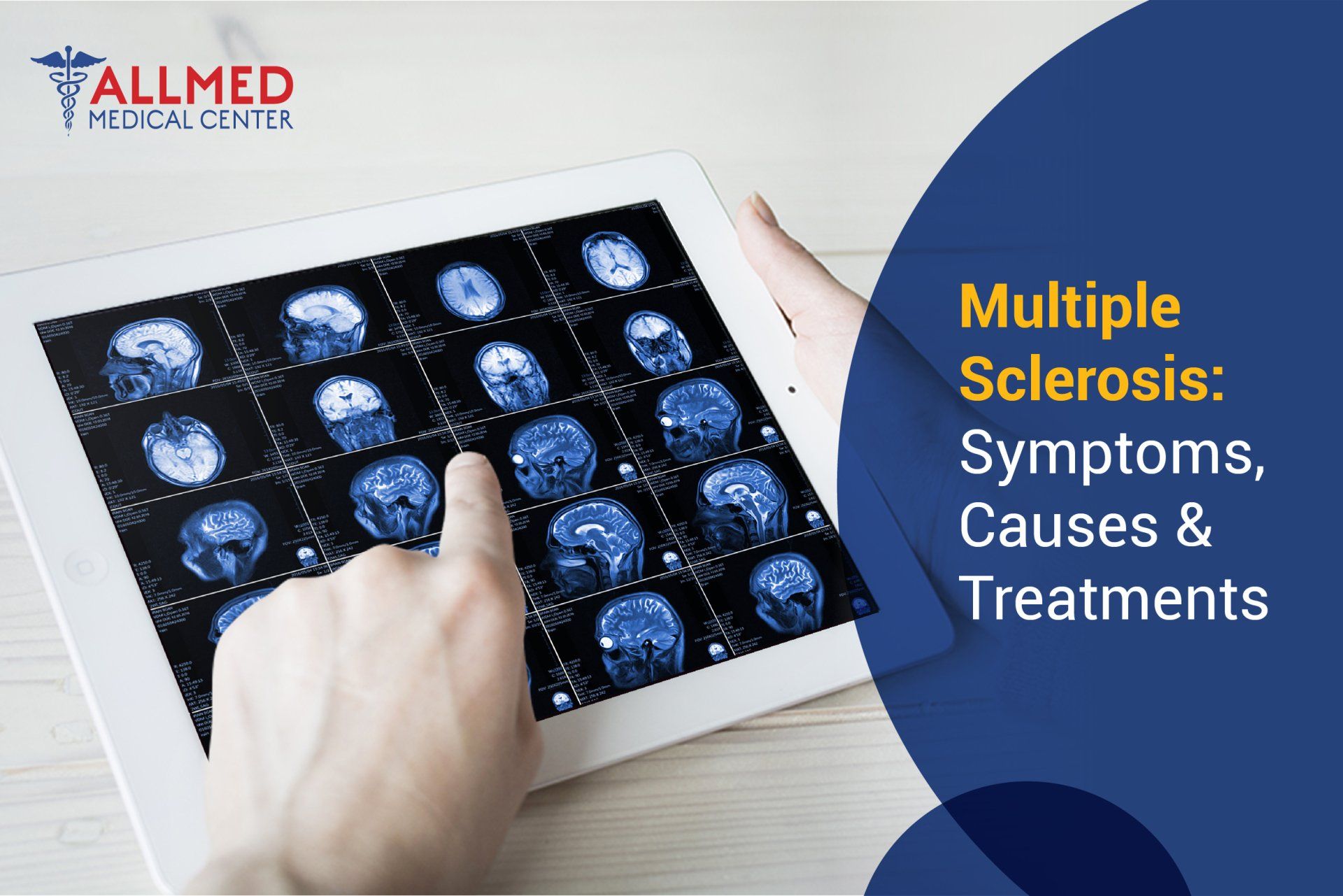
We Proudly Accept Medi-Cal and Medicare
Write your caption hereButton
Now Accepting Walk-ins!
Write your caption here

We Proudly Accept Medi-Cal and Medicare
Write your caption hereButton
Now Accepting Walk-ins!
Write your caption here

The central nervous system controls the majority of the functions of both body and mind. We must take care of our nervous system to maintain a healthy and productive life. Unfortunately, the disease known as multiple sclerosis can affect your nervous system with unrelenting blows. It is a chronic disease that may damage your brain, spinal cord, and optical nerves. If one of these organs is compromised, your body may experience severe complications. Fortunately, modern medicine has provided ample information on fighting multiple sclerosis.
We'll discuss multiple sclerosis in this article, highlighting its symptoms, causes, and treatment. In addition, we'll provide helpful tips for you if you are living with multiple sclerosis. Our purpose is to efficiently provide you with relevant information to battle multiple sclerosis. So, let's start with the definition.
What is Multiple Sclerosis?
What is sclerosis? Multiple sclerosis or MS is a potentially debilitating and disabling disease of the central nervous system. With MS, your immune system attacks myelin (the protective sheath that covers nerve fibers), resulting in miscommunication between the brain and your entire body. Unfortunately, if the disease progresses to a severe level, it can cause long-term and permanent damage. In worst cases, you may lose the ability to walk altogether. Experts refer to MS as an autoimmune disease - a health condition in which the immune system treats healthy cells like a threat, like a virus or bacteria. Multiple sclerosis refers to as "scar tissue in multiple areas."
They primarily affect the following:
- Brain stem
- Cerebellum
- Spinal cord
- Optical nerves
- Some regions in the white of the brain
The Signs and Symptoms of Multiple Sclerosis
The multiple sclerosis symptoms depend on the severity of the disease. And, since it affects multiple parts of the central nervous system, it may sometimes be challenging to detect. On the other hand, we compiled the most common signs of multiple sclerosis reported by health professionals. Here are the signs to watch out for:
- Unusual muscle weakness
- Numbness and tingling sensation (pins and needles)
- The Lhermitte's sign (electric shock sensation while moving the neck)
- Loss of bladder control
- Problems with bowel cycle
- Unusual fatigue
- Dizziness/ vertigo
- Sexual dysfunction (male and female)
- Muscle spasms
- Involuntary tremors
- Compromised vision
- Mobility/ gait problems
- Extreme emotional changes/ depression
- Concentration and memory problems
- Neuropathic pain
Here are some of the less common signs:
- Headache
- Loss of hearing
- Itchiness
- Breathing problems
- Seizures
- Speech problems
- Swallowing difficulties
Generally, these symptoms start subtle and do not progress after months or even years. On the other hand, some people may have a faster disease progression.
What Causes Multiple Sclerosis?
More information is needed to identify the root cause of multiple sclerosis. However, medical researchers concluded that MS results from a combination of genetic and environmental factors.
The Risk Factors of Multiple Sclerosis (How Do You Get MS?)
Common MS risk factors
Age. Although the ages 20 to 40 are most susceptible, younger and older individuals may develop the disease.
Gender. Women are three times more at risk than men.
Family history. Individuals with family members who have MS are likely to develop MS too.
Some types of infections. Some viruses may trigger the disease, such as the virus that causes infectious mononucleosis or Epstein-Barr.
Race/Ethnicity. Caucasians are more at risk than Asians, Africans, and of Native American descent.
Climate. People living in temperate climates are more at risk.
Vitamin D deficiency. Individuals with low vitamin D levels are more at risk, especially when exposed to direct sunlight for prolonged periods.
Smokers. Cigarette smokers are more likely to develop MS than non-smokers.
Complications of Multiple Sclerosis
Unfortunately, people with MS may also experience complications, especially if left untreated. Here's a list of the possible effects of MS and complications:
- Sudden muscle stiffness and spasms
- Lower body paralysis
- Extreme mood swings/ depression and anxiety
- Epilepsy
Treatment for MS
Modern medicine confirmed that there is no cure for multiple sclerosis. On the other hand, it is highly manageable. Doctors have proven methods to slow the disease's progression, reduce relapse severity, and alleviate symptoms.
Here are the treatment methods:
Medications
The medication slows the progression of the disease. The drugs used for this method modify the way the immune system works.
Examples:
Intravenous
- Interferon beta 1-a (Avonex and Rebif) and peginterferon beta-1a) (Plegridy)
Oral
- fingolimod (Gilenya) and mayzent (siponimod)
Infused
- mitoxantrone (Novantrone) and ocrelizumab (Ocrevus)
These drugs are recommended depending on the severity of the disease and its current progression stage. Doctors will monitor your condition and provide the necessary dosing.
Alternative Therapy
- Acupuncture
- Stress management therapy
- Change of diet
- Exercise (low impact)
- Massages
- Avoiding bad habits like smoking and drinking alcoholic beverages
Physical Therapy (Rehabilitation Programs)
- Physical therapy: for restoring mobility function and recovery
- Occupational therapy: to maintain self-care
- Speech therapy: to improve speech and swallowing
- Cognitive therapy: to help maintain focus and concentration
- Vocational rehabilitation: to help the individual with MS cope with a better-suited job
Manage Multiple Sclerosis Effectively with AllMed Medical Center
AllMed Medical Center cares about you and your entire family. We specialize in disease prevention based on your individual needs. Our goal is to provide the best treatment for multiple sclerosis with the help of early detection. If you think you or a family member is at risk of MS, please give us a quick call today.
AllMed Medical CentersServing
Greater Sacramento
Allmed Medical Center | All Rights Reserved.










